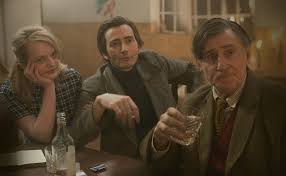Eye For Film >> Movies >> Mad To Be Normal (2017) Film Review
Mad To Be Normal
Reviewed by: Luke Shaw

RD Laing was, and still remains, a largely controversial figure in the field of psychiatry. Like his American contemporary, Timothy Leary, he emerged as a kind of figurehead of a new kind of counterculture in the Sixties, often typified as Radical Theory. He was opposed to the punitive and often barbaric methods of treatment, such as isolation and electroshock therapy, that the establishment was advocating for, instead believing madness was a deep and inevitable symptom of the human subject living in a society that was not suited for them.
Robert Mulan’s biopic of the Scottish eccentric sadly doesn't take much more than a surface level look at the man himself. Tennant imbues Laing with the fizzling wit and glint in the eye charisma you’d expect from such a character, has his speech mannerisms spot on, especially when delivering academic speeches. Sadly, like many biopics, the film blends so many elements of the life of its subject that it starts to lose focus, and falls back on a relationship conflict to lend some backbone.

Elizabeth Moss ends up playing the source of friction in the story, Robert’s wife Angie Wood, Initially dazzled by Laing’s brilliance, she ends up being portrayed as a thorn in his side as she craves safety for her family, and all of his attention. It’s the kind of conflict that has been done to death - the harridan pecking at the staggering genius - and it isn’t really performed with any dignity here. It leaves a bad taste, regardless of whether it is accurate or not, and is the least interesting aspect of the film.
Whilst this relationship is awfully cliched, the focus on his pet project, Kingsley Hall, fares much better. This loose commune of patients suffering from various forms and levels of psychosis, free of the trappings of other psychiatric establishments, Kingsley Hall allowed Laing to experiment with radical new techniques such as listening to the patient, the revolutionary nature of which feel absurd today, but is communicated well in the film.
Amongst his patients are the Jim (Gabriel Byrne) and Sydney (Michael Gambon) who represent the virtues and deficiencies of the treatment method. Jim initially appears to be a helpful sort, tortured by a desire for a quiet and calm that inner voices don’t let him have, but over the course of the film transforms into a terrifying presence that spouts amalgamations of various biblical passages, threatening to become “the dragon waiting at the entrance of the cave” to eat the baby of Laing and Angie. Sydney responds better (especially to the controversial LSD therapy) and begins to dig up repressed memories with Laing’s aid.
Jim’s impending violence provides a reason for Angie’s worrisome nature, but it all feels rather contrived, and constructed to tie into Laing’s writings on family, giving the impression of him as a man who is torn between his writing and practices as his personal life in a simple and underdeveloped way. Similarly, his family back in Glasgow are turned into another emotional challenge for Laing that play on a general desire to see children remain safe, even though they are barely developed.
Despite this, his interactions with difficult patients show how devoted he was to his philosophy of compassion and understanding. The decision to end the film in medias res is a bizarre one. Most biopics finish at an arbitrary point (unless a death is involved) but Mad To Be Normal lacks any real denouement due to its lack of a strongly defined narrative outside of its trite central conflict.
Reviewed on: 02 Mar 2017



















